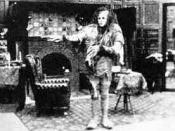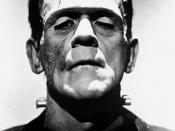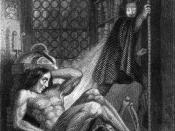Frankenstein Film to novel comparison and interpretation Kenneth Branagh's version of Mary Shelley's Frankenstein is for the most part a successful interpretation. It could have been better. Changes in the plot and character's of the novel changed the message that Shelley was trying to get across and he even introduces more messages which in the end make up for the losses in Shelley's messages. Changes in the characters and in the plot changes why Victor acts the way he did. In a way it almost excuses him from looking like and idiot and a fool. In the novel the way the events were certainly all Victor's fault and he should have been intelligent enough to be more aware. In the film however changes in the plot allow Victor to be oblivious with a cause.
In the novel Victor runs away from his creation when he sees it come to life.
He runs to the other room like a little baby. This I could not comprehend. It was his creation. He should have taken responsibility for it and taken care of it. Instead he leaves the poor "monster"ÃÂ to his own devices, leaves him to learn about this cruel world on his own. Bad decision on Victor's part. Later he calls the "monster"ÃÂ a blood thirsty wretch who takes pleasure in killing man. Well if Victor was ugly enough to cause men to hit him with clubs and caused women to fain the would hate man too. Victor was in a sense a father to the "monster"ÃÂ but instead of teaching him right from wrong he left the "monster"ÃÂ to find out for himself. If Victor had been there to care for the "monster"ÃÂ the tragedies would never have taken place.
In the film at the creation of the "monster"ÃÂ victor tries to help him stand up and walk but there is and accident that causes Victor to believe that the "monster"ÃÂ is dead. This gives him reason to leave the room, rather then fleeing like a scared babe as he did in the novel.
Character changes are key. They cause Victor to react differently to situations. Take Clerval for instance. He was not killed in the film. His death was key. Victor would have seen more clearly that the "monster"ÃÂ was seeking revenge on the ones he loved and not he himself. It gave him and excuse to be a fool. In the novel he had no such excuse. He was merely just a fool. Also the role of his teacher and mentor, Waldman. In the film he is the one who inspires Victor to try and create a life. Waldman had already begun preliminary experiments which demonstrated how life could be created. In the novel he does not provide such great a role. Victor was left to his own devices completely and relied on his own demented mind to create the very thing that led to his downfall.
Despite the changes which caused Victor to be able to excuse his behavior Branagh's film makes up for it in the end and really makes Victor look stupid. This is the scene in which Victor brings Elizabeth back to life. Now the one thing that the monster asks for Victor decides he can not provide because of the ethical conflictions it has. Yet he can create a person for himself. Now why wouldn't he have done that in the first place, gotten rid of the monster and lived happily ever after? Because he was a fool plain and simple. Branagh's film was a successful interpretation because it still made Victor look like and Idiot. Making Victor look like a fool teaches us the lesson that man should not play God. We have too many feelings to make proper decisions and it can even get to the point where those very feeling begin to control our lives.





